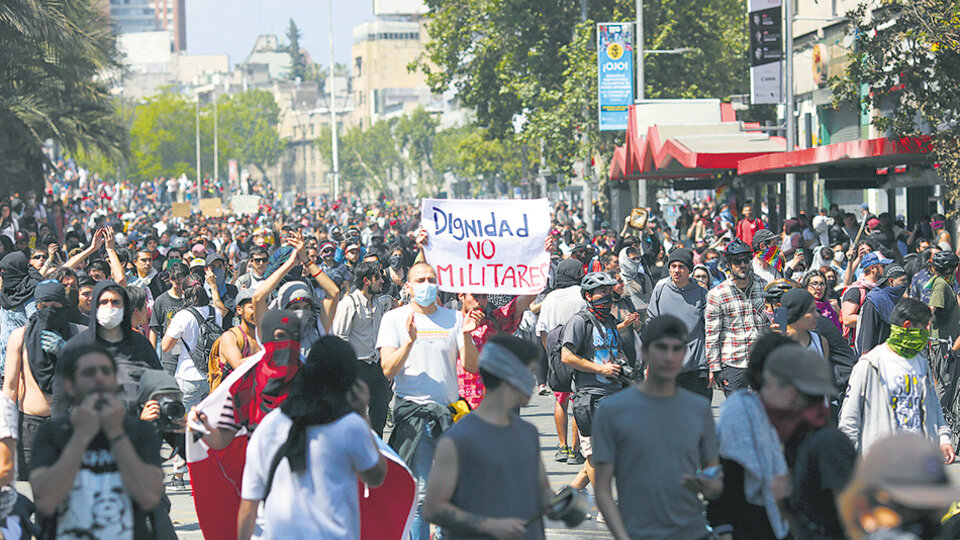
[ad_1]
Social protest and growing violence in the streets of Chile. According to official data, eight people died and more than 200 were injured, the vast majority of them in the capital, Santiago. The National Prosecutor's Office has informed that until Sunday 1462 are people arrested after protests that began this Friday as a result of the rejection of the increase in the metro ticket, which was finally suspended on Saturday. However, the mobilizations and the cacerolazos spread in the country, new clashes take place between civilians and military and police forces, and the looting is repeated in several parts of the city. EPresident Sebastián Piñera once again declared curfew and declared that his country was "at war with a powerful and implacable enemy"", in connection with the violent groups that plunged the country into a state of emergency that has already cost the lives of several people.
"We are at war with a powerful and implacable enemy who respects nothing and who is willing to use limitless violence, even when it involves the loss of human lives, for the sole purpose of causing the most possible damage, "Piñera said during a public appearance before the press. The conservative president said he understands that the people are showing their concern, but added that those who cause fires, barricades and looting are "real criminals".
The dead recognized until now have died in similar circumstances. On one side, two women died in the middle of a looting in a supermarket in the municipality of San Bernardo, and a third person remains in serious condition, with 75% of his body burned. Also Saturday night, a man died in another fire in a supermarket, this time in the municipality of Quinta Normal. At the same time, Sunday afternoon, firefighters in the commune of Renca announced the death of five people, whose bodies were found burned in the cellars of Kaiser. The women's underwear shop was first ransacked and then burned. The deceased would not be local workers.
Minister Chadwich also claimed that two civilians had been shot dead, but gave no further details. The national prosecutor's office said that until this Sunday, there are 1462 detainees in Chile. The prosecution said that of the total arrests, 614 were in Santiago and 848 in the rest of the country.
Violent clashes between police and protesters were again unleashed on Sunday in various parts of Santiago. A popular cacerolazo, which sounded strong in much of the capital, again led to clashes with military forces and police, who cracked down on protesters using tear gas and rubber bullets.
In the face of chaos in the streets, President Sebastián Piñera has declared a curfew for the second day in a row. This time, the start of the measurement was advanced at 7 pm and extended until 6 am on Monday. "The curfew will come into effect from seven o'clock in the afternoon, stay calm and be at home," said General Javier Iturriaga, announcing the measures taken in the middle of "l & # 39; state of emergency "which governs five regions of Chile.
After a meeting at the seat of government with the Presidents of the Chamber of Deputies, the Senate and the Supreme Court, Piñera said: "Democracy has not only the right, but also the obligation to defend itself by using all instruments provided by its own means. " democracy and the rule of law to fight against those who want to destroy it. "
"A real oasis"
On Thursday, when social unrest began to be reflected in the subway stations, the president granted an interview to the Financial Times where he described Chile as "a real oasis in the midst of this convulsed Latin America". Earlier, Nicolás Monckeberg, Minister of Labor, had suggested starting work at 7:30 to get there faster. The Minister of Economy, Juan Andrés Fontaine, had recommended taking the metro at 7 am to avoid climbing. The various officials only reinforced the conflict.
The incidents erupted sharply Friday after the metro ticket rate hike, a measure suspended by the government on Saturday. The announcement was not enough, however, as the protests gave rise to various social demands. Behind the so-called political stability and positive macroeconomic figures presented by the country, vast social sectors have been excluded, showing a profound social inequality.
Many in Chile recalled the years of Augusto Pinochet's dictatorship (1973-1990) for the imposing presence of military men in the streets, who do not keep only the critical points of the city (meeting centers protesters and all metro stations). but also patrol the streets with tanks and jeeps. Military planes complete the scene by flying over the streets of Santiago, while the barricades in the streets extend.
The protagonists of the protests that have invaded the streets of Santiago are mainly young people who walk in the streets in groups and wearing neckerchiefs. "We have to bring these scarves not to cover our faces, but to protect ourselves from the gas," said Elisa. Another of the young protesters carried a sign saying: "Fly and plunder, HDP". "The united peoples will never be defeated," shouted the chorus students, repeating a slogan that became popular during protests against the dictatorship of Augusto Pinochet.
Virtually all shops remain closed and there is little public transport, while suspensions and cancellations of flights are repeated. There are also power outages and there is a lack of water in some parts of Chile. The students call to continue to mobilize in the next hours. Monday, most universities and colleges have already suspended their courses.
Report: Guido Vassallo.
.
[ad_2]
Source link
 Naaju Breaking News, Live Updates, Latest Headlines, Viral News, Top Stories, Trending Topics, Videos
Naaju Breaking News, Live Updates, Latest Headlines, Viral News, Top Stories, Trending Topics, Videos